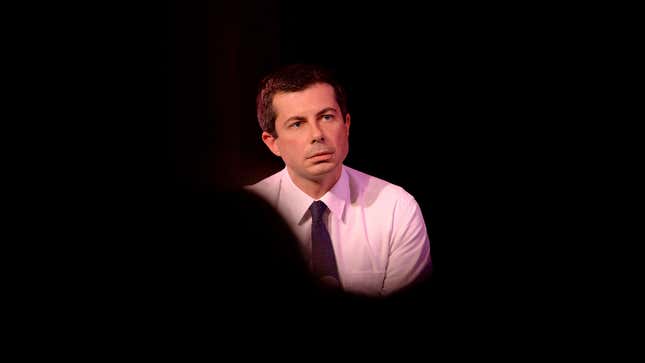

Pete Buttigieg sucks, for all the reasons I laid out in detail here—from his technocratic worldview to his penchant to describe his milquetoast policy plans as a sort of pragmatic progressivism. But a new reason to add to the list? His newly discovered contempt for Medicare for All, which he deployed—some might argue cynically and opportunistically!—as his main line of attack against Elizabeth Warren and Bernie Sanders during the Democratic primary debate earlier this week. Was his hard pivot against the proposal a sincere reflection of his policy position? Maybe! Was it a desperate attempt to claw at relevance with the older, wealthy white voters who seem to like him? Perhaps! Either way, what a weenie!
In September, Buttigieg released a detailed version of his health care plan—which is notably not Medicare for All—but what he calls Medicare for All Who Want It. Get it? By including “Medicare for All” in the name of his plan, despite it not being Medicare for All and maintaining a significant role for private insurance companies to keep raking in profits, he gets to claim that he supports the idea while working diligently to keep it from succeeding. (Congresswoman Pramila Jayapal, the sponsor of a strong Medicare for All proposal in the House, recently called out this kind of mislabeling: “I appreciate the robust healthcare debate my Democratic colleagues have brought to the table,” she tweeted this summer. “But as lead sponsor of Medicare for All, I find it misleading when my fellow Democrats use the M4A name to describe proposals that are not Medicare for All.”)
It’s a neat trick, really. But as the Washington Post wrote in an analysis of Buttigieg’s plan, “[W]hen it comes to expanding coverage to the uninsured and making it more affordable for people, the Buttigieg ‘plan’ is comparable to the public option plan from the race’s top moderate, former vice president Joe Biden.”
And as Tim Faust, the author of Health Justice Now: Single Payer and What Comes Next, laid out in Splinter (RIP), people really invested in universal access to medical care should be wary of plans like Biden’s and Buttigieg’s. “If you hear 2020 candidates talk about the rot of American healthcare, look out if they float a ‘pragmatic policy solution’ or talk about plans named something like ‘Medicare Extra As A Service… For You!’” Faust cautioned, adding, “If they’re polite, perhaps they will at least say they support ‘Medicare for All’ before announcing they’d be open to keeping the feet of private insurance companies on our throats.” The danger of proposals that maintain a role for private insurers, he explained, are many—not least of which is that they would fail to create a “universal risk pool,” which would lower costs for everyone. (Consider, here, the failures of the Affordable Care Act, which I know well, having paid for health insurance through the marketplace as a freelancer and watching my premiums go up every year while my coverage got worse.)
And unfortunately for Buttigieg (and infuriatingly for me), he used to claim to be a supporter of Medicare for All. How convenient, then, that he discovered a new sense of outrage over the proposal at a debate in which his flailing campaign fought to establish the South Bend mayor as America’s Next Top Moderate. It’s actually because of this hard turn that his recent comments in support of the policy have been recirculating among political journalists and supporters of Medicare for All.
-

-

-

-

-

-

-

-

-

-

-

-

-

-

-

-

-

-

-

-

-

-

-

-

-

-

-

-

-

-

-

-

-

-

-

-

-

-

-

-








































